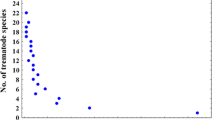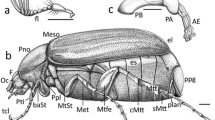Abstract
The hypothesis of a positive correlation between host specificity and taxonomic diversification was tested in a family of fish ectoparasites, the Diplectanidae Bychowsky 1957 (Monogenea). A comparative analysis of correlation of species richness with host specificity was performed using an adapted independent contrasts method. In order to control for phylogenetic effects, a phylogenetic tree of the genera in the Diplectanidae was reconstructed using morphological characters. The current taxonomy is retrieved in this phylogenetic hypothesis, except for the Murraytrematoidinae subfamily, which appears to be paraphyletic. There is no significant correlation between host specificity and taxonomic diversification in the Diplectanidae. The significance of this result is discussed, and different hypotheses which could have led to this observation are presented.
Similar content being viewed by others
Author information
Authors and Affiliations
Additional information
Received: 26 August 2000 / Accepted: 8 September 2000
Rights and permissions
About this article
Cite this article
Desdevises, Y., Morand, S. & Oliver, G. Linking specialisation to diversification in the Diplectanidae Bychowsky 1957 (Monogenea, Platyhelminthes). Parasitol Res 87, 223–230 (2001). https://doi.org/10.1007/s004360000325
Issue Date:
DOI: https://doi.org/10.1007/s004360000325




